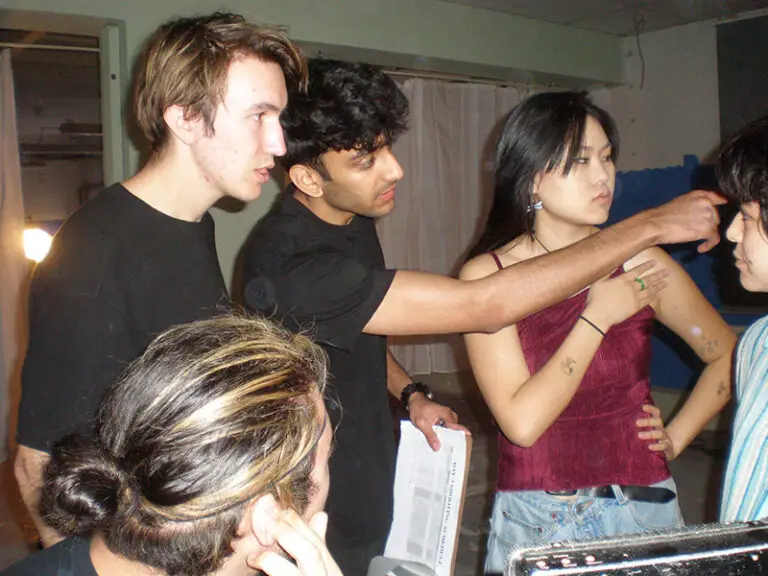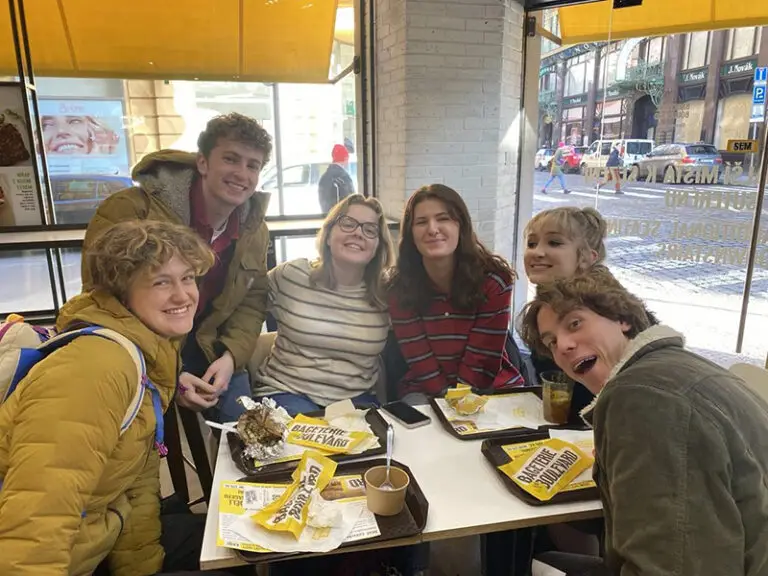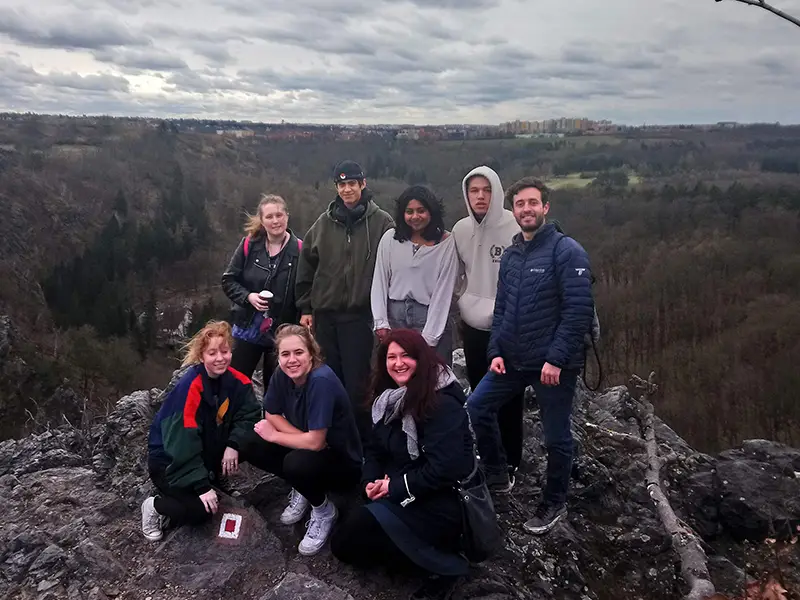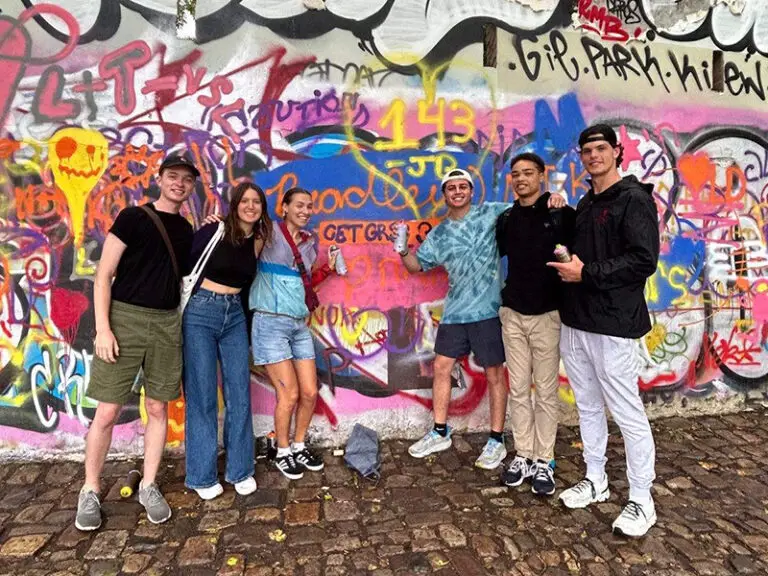CET recommends credits for FAMU elective courses according to the standard 2:1 ECTS conversion ratio that is used at most US colleges and universities. This means that if you enroll in a 3-credit course at FAMU, we will recommend that you earn 1.5 credits. That said, final credit allocations are always ultimately at the discretion of your home institution. Please check with your home institution about credit conversions before you leave the US.
CET Film Production at FAMU Study Abroad
CET Film Production at FAMU: At-A-Glance
Work with 16mm
or 35mm film
or 35mm film
Electives in all aspects of film production
Produce a 7-10 minute film
English-taught courses
Czech language class
Direct-enroll classwork at FAMU
The Film and Television School of the Academy of Performing Arts in Prague
Fall
- Arrival: 08/21/2025
- Departure: 12/18/2025
- Recommended Credits: 13-17
- Fee: $22,990
- Application Deadline: April 1
SPRING
- Arrival: 01/15/2026
- Departure: 05/14/2026
- Recommended Credits: 13-17
- Fee: $22,990
- Application Deadline: October 1
Fall
- Arrival: 08/21/2025
- Departure: 12/18/2025
- Recommended Credits: 13-17
- Fee: $22,990
- Application Deadline: April 1
SPring
- Arrival: 01/15/2026
- Departure: 05/14/2026
- Recommended Credits: 13-17
- Fee: $22,990
- Application Deadline: October 1
Take on a busy and challenging semester mastering both the process of filmmaking and the medium of analog film itself (16mm or 35mm). Film Production students work in groups of three or four to see their short film through every stage—from pitching to filming, and even color grading in post-production—while working alongside professionals and under the guidance of experienced mentors at FAMU. You leave Prague with a project for your portfolio, a better sense of the ins and outs of the film industry, and the confidence and skills to take on your next future creative endeavor.
Academics in Prague
Semester
Snapshot
- Pre-requisites: Various filmmaking pre-requisites. Learn more.
- Produce a 7- to 10-minute film
- Choose to work with 16mm or 35mm film
- Electives in all aspects of film production
- Focus on traditional filmmaking
- Host University: Film and Television School of the Academy of Performing Arts in Prague (FAMU)
Curriculum & Syllabi
You take two core courses in film production, one language class, and enroll in one to three FAMU International electives to meet the recommended 13 to 17 total credits. Your Czech language class is taught by CET, while the remainder of your curriculum is taught by experienced FAMU faculty active in their fields.
Core Course
You take two courses taught exclusively for CET students by FAMU faculty. These courses include workshops and exercises (e.g. lighting workshop, mise-en-scene exercise, etc.). FAMU faculty offer mentorship as they guide you and your group through the process of creating your final film.
- PR/FILM 410 Narrative Film: Pre-Production and Production (130 hours, 6 credits)
- PR/FILM 420 Narrative Film: Post-Production and Final Product (65 hours, 3 credits)
Electives
Many electives at FAMU are open to CET students. Take one to three electives to meet the total of 13 to 17 recommended credits. Courses and credits differ each term but past students have taken:
- Soundtrack Aesthetics
- Script Analysis
- The Realm of Montage
- Film Style and Form
- Filming the Unfilmable
Visual Theory 1
Acting Theories
Essential Elements of Film Sound - Short Film Practical Analysis
- Cinemadance
Note for browsing the course catalog at FAMU:
Terms: Winter is the FALL semester; Summer is the SPRING semester
Terms: Winter is the FALL semester; Summer is the SPRING semester
You may also substitute one FAMU elective for a CET Prague elective.
Czech Language
You take 18 hours of intensive Czech in the first week, and have reduced class hours after that. Most students are Czech language beginners, but if you’ve taken Czech before, we have a class for you, too. This class is exclusively offered for CET students.
- PR/LANG 101 Beginning Czech Language (3 credits)

Get real world experience in Prague
Study at FAMU. You take classes at FAMU, the Film and Television School of the Academy of Performing Arts in Prague, one of Europe’s foremost film academies. Your day-to-day reflects the fast pace, fluidity, and occasional unpredictability of industry life.
Work with your group. Work in groups of three to four to develop a film from start to finish—pitch your ideas, refine your group’s script, and make plans for your final days of shooting*. Collaboration and cooperation are huge parts of filmmaking, and you have plenty of chances to build these skills.
Lighting workshop. Practice your technical skills during a three-day workshop at a FAMU studio. Learn the appropriate lighting for indoor, outdoor, evening, candlelight, and mood-eliciting shots. When you’re done, head to Barrandov film studios, the MGM of Prague, and conduct a telecine transfer of your footage.
*Note: Because this is a start-to-finish film production program, time spent shooting on camera is limited to shooting days and the lighting workshop.
Housing and Meals
- Apartment
- Off-campus housing
- Live with CET peers & local Czech students
- 2-10 people/apartment
- 2-3 people/room
- 20-30 minute commute via tram
- Fully equipped kitchen, common area, shared bathroom, in-unit washing machine
- Wifi access, linens, towels, basic furnishing, kitchenware
Living Like a Local
Local Roommates. Czech students live in your apartment building to help you acclimate to life in a new country. They also organize regular activities—or “Czechtivities” as they are lovingly called on site—so you can explore Czech culture or the city itself. You might go for a countryside hike, explore a nearby town, or head to the opera. Learn more about living with a local roommate.
Eating in Prague. For meals, take advantage of the exceptional and affordable food scene in Prague. Try out Czech favorites like chlebíčky (open face sandwich with unique ingredients) and smažený sýr (fried cheese with potatoes and tartar sauce). Grab a treat at one of the city’s farmers markets. Ready for a home-cooked meal? Grab ingredients at the grocery store and have a night in with your roommates. Learn more about accommodating your dietary needs in Prague.

Life in Prague

- Known locally as: Praha
- Population: 1.3 million
- Local Currency: Czech Koruna (Kč)
- Famous for: Prague Castle, Charles Bridge, lower cost of living in Europe, great public transport, beautiful architecture
Enjoy the perks of living in “the world’s greenest city” by reading in the park. Roam the streets and find your favorite view. Develop your script with your group at a cozy neighborhood café. See a world-class play at one of the city’s many beautiful theaters. Need a break from your busy semester? Get lost in the winding streets of the Jewish Quarter, museum hop from the National Gallery to the DOX Center for Contemporary Art, then unwind with a riverside stroll. Prague has a little something for everybody.
Experience Central Europe with CET
Away from the city. Prague’s central location means easy access to the rest of Europe—but with so many CET-arranged excursions, you may not need to leave. All students visit UNESCO World Heritage site Český Krumlov during orientation. Explore Kutná Hora and its unique architecture or the medieval town of Jachymov. Spend a film-focused long weekend in Berlin, Germany. Get a backlot tour of Babelsburg Studio, visit a film museum, and engage with young German filmmakers. Later, attend a film festival. Fall students usually go to the Ostrava Kamera Oko International Film Festival in Ostrava while Spring students usually attend the One World Fest or Febio Fest in Prague.
Student Resources
"Even when there were miscommunications, mess ups, or inconveniences, each film was finished in the end. While I feel like I still have a lot to learn in terms of how to work effectively on a set with different personalities and unique circumstances, I feel I have gained such a breadth of on-set experience here in such a short while."
— Olivia Charis,
Yale University | Spring student
READ OLIVIA'S BLOG— Olivia Charis,
Yale University | Spring student
"If you are a filmmaking student looking for a program to develop your knowledge and skills, this program would be a strong choice. The variety of classes and the opportunity to work with 16mm film have allowed me to learn so many new skills in such a short time. However, this program is quite different than your traditional study abroad. I would highly encourage any student to consider what they want to prioritize with their study abroad experience."
— Christian Kelly,
Elon University | Spring student
— Christian Kelly,
Elon University | Spring student
"I learned so much from the three days in the lighting workshop! I haven't had the chance before to use that level of equipment and have that degree of creative control in a studio of that quality. It was an excellent opportunity to understand how to use the camera, light a scene, and ultimately capture the types of shots and scenes you want to."
— Anna Kristofick,
Vassar College | Fall student
— Anna Kristofick,
Vassar College | Fall student
"The process of making a short film, even the shortest of short films, is remarkably more time-consuming and arduous than what I imagined it would be prior to studying film. I had filmed things for class back at my home university, and I understood the vague idea of the filmmaking process, but this was my first 'real' experience in that field."
— Katherine Chang,
American University | Fall student
READ KATHERINE'S BLOG— Katherine Chang,
American University | Fall student
"Accept the fact that this program is very challenging and time consuming, and allow yourself to feel those challenges with your peers because everyone is in the same boat. Don't worry about your peers having more experience or knowing more about film because everyone comes here to learn and do the same thing."
— Abby Metcalf,
Franklin & Marshall College | Spring student
— Abby Metcalf,
Franklin & Marshall College | Spring student
"I learned how to work with people I don't generally mesh well with and still maintain professional relationships. I also learned so much about 16mm and 35mm film cameras and lenses when I was an operator and assistant camera. I learned from my mistakes and created something that I am happy with."
— Anaya Battle,
Muhlenberg College | Spring student
— Anaya Battle,
Muhlenberg College | Spring student
On-the-ground support
Navigating a new city, country, and culture is a big challenge worth taking—and we’re here to help you along on this adventure. Our on-site team is bilingual, provides round-the-clock support, and is passionate about sharing their love of Prague (and the Czech Republic!) with you.

Program Fees
Fall/Spring
$22,990
What's Included
Tuition
All of your classes and program-related learning are included with your tuition.
Housing
We arrange your housing in a fully-furnished apartment in a residential neighborhood of Prague. Walk or use your CET-provided public transportation pass to get to class. Your program fees go toward rent, utilities, furnishing, and other management costs.
Funding for Film Project
A budget for your film project is included with your program fee. No crowd-sourcing necessary.
Transportation Pass
You’re provided with an unlimited public transportation pass. Use the bus, metro, and tram to your heart’s content.
Staff Support
From pre-departure to orientation, from on site to re-entry, CET provides you with the support you need every step of the way.
Insurance
You’re provided with a comprehensive insurance plan through GeoBlue that even includes medical evacuation coverage.
Activities & Excursions
The excursions, workshops, and activities that we arrange are included in your tuition.
Visa Support
We guide you step-by-step through the visa process. You do the legwork, but we’ll make sure you have the documentation and information you need, when you need it.
Course Materials
Your textbooks and course supplies are covered and waiting for you on site.
Transcript
You receive an official transcript jointly issued by CET and FAMU at the end of the term. If your home institution requires a School of Record transcript, CET is able to provide one through the University of Minnesota.
More on finances

Program fee breakdown. Of the total program fee, $18,990 goes to tuition and fees, and $4,000 goes to housing and other student life fees.
Local cost of living. Relative to the US and other countries in Europe, the cost of living in Prague is considerably more affordable. On average, food, toiletries, and housing goods are cheaper than in the US.
Estimated out-of-pocket expenses:
- Round-trip Airfare: $1,000 - $1,500
- Meals: $2,000 - $2,500
- Personal Expenses: $1,300 - $1,500
- Visa Fees: $110 - $130
- Fees related to FAMU Electives: Varies
additional resources
How to Apply
Eligibility
General pre-requisites:
- • Must be 18 or older at the time of program participation
- • Open to students from any US college or university
- • GPA: 3.0 or higher is recommended, students with lower GPAs will be asked for a faculty recommendation to supplement their applicatio
film pre-requisites:
- • 16 mm Narrative Track: Previous experience in filmmaking, film theory, visual arts, or photography is highly recommended but not required.
- • 35 mm Narrative Track: Previous experience with 16mm is required.
- • Ability to work as part of a team
Online Application Form
Complete the application through your CET Compass account. This is a brief form that asks for basic information and has a few short answer questions about why you want to study abroad.
Portfolio Submission
All applicants for the CET at FAMU programs are required to submit a portfolio of visual work. Learn more about portfolio requirements and the admissions process.
Faculty Recommendation
This is an online recommendation form to help us understand your film/artistic experience. If you’ve previously taken a film course, you must select a faculty member from your school’s film department. If you haven’t taken a film course or there is no film department, you may choose a faculty member from an Arts or English department who can speak for your artistic work. If you’re applying for to work with 35mm film, the faculty you choose should understand your prior experience with 16mm film.
Passport Information
Upload a scan of your passport to your CET Compass account. This should be a single scan that includes the signed signature page and the photo/personal details page. Don’t have a passport yet? Let us know and we can help advise you.
Study Abroad Office Recommendation
This is an online form that your study abroad office completes to let us know you meet the requirements to study abroad. To send the electronic form request, simply enter the name and email address of your study abroad advisor in the designated fields of your CET Compass account.
Official Transcript
Your CET Compass account has specific instructions for submitting an official transcript.
Application
Deadlines
Fall Semester:
April 1
Spring Semester:
September 1
Priority Deadline
October 1
Final Deadline

Have a question? Get in touch!
Celine Okome
Student Services Coordinator
202.315.0216
[email protected]
Price Subject to Change:
CET reserves the right to increase quoted charges at any time without prior notification, based on increased instruction costs, exchange rate fluctuation or other cost increases beyond CET’s control.